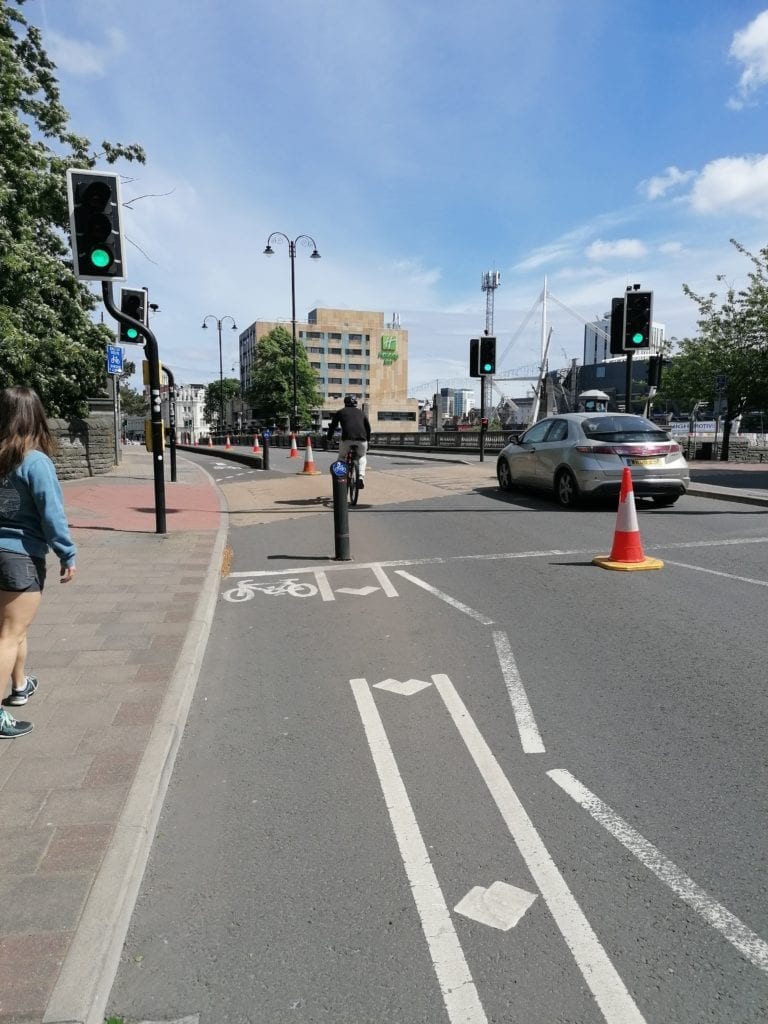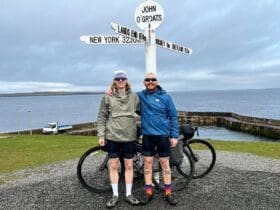A coalition of charities are campaigning to ensure that new temporary transport measures consider the long-term impact on the blind and partially sighted community in Wales.
RNIB Cymru and Guide Dogs Cymru are leading the charge to raise public awareness of the issues people with sight loss and mobility issues face when trying to get around safely.
The charities are calling for Welsh Government to back a Coronavirus Courtesy Code that aims to promote safe social distancing for all pedestrians, road and public transport users.
As coronavirus lockdown measures are slowly eased, Governments across the UK have signalled intentions to make changes to our streets to enable safe social distancing and encourage a shift towards more sustainable active transport.
In Welsh cities, new street layouts are starting to be introduced, using cones and barriers to widen footways along lengths of road to provide more space, allowing people to socially distance.


But cones, tape and other temporary measures are not suitable for people with sight loss. Guide dogs do not perceive these as solid obstacles and will attempt to navigate between them. These are also difficult to detect using canes.New temporary signs can cause injury to blind and partially sighted people trying to get around, and visual indicators such as painted lines on the road are often difficult or impossible to see.
Campaigners are also concerned that creating ‘shared spaces’ for both cyclists and pedestrians will be dangerous for people with sight loss, who are often not aware that a cyclist is approaching.
RNIB Cymru campaigner Howell Williams, 67, from Cardiff, visited Castle Street to see the new street layouts.
“I was appalled,” he said. “There were more cyclists on the pavement than ever before, I counted 15 in ten minutes. Not many of them seemed to be using the new cycling lanes, it seems to have given them free rein to go wherever they like.
“I could have been knocked over at any moment, and there is so much extra street clutter to navigate around. It felt like an accident waiting to happen. As a partially sighted person, this is going to make it very difficult for me to get around the city centre.
“I think there should have been more consideration of people with mobility and vision issues before this was put in place. These measures could be very detrimental for so many people if rolled out further without more thought as to how it will affect the thousands of people like me in Wales.”
The charities have written to Lee Waters MS and every local authority in Wales with their recommendations, asking him to assess the equality and accessibility impact of the temporary travel measures he has proposed. Their recommendations are supported by Disability Wales, Living Streets, Ramblers, Learning Disability Wales, Diverse Cymru and Bus Users Wales.
Ansley Workman, Director of RNIB Cymru said: “RNIB Cymru and Guide Dogs Cymru fully support a shift towards more sustainable travel. Many blind and partially sighted people enjoy walking and tandem cycling and a reduction in air pollution is a positive development for the whole community.
“However, street layouts can cause difficulties at the best of times for people with blind and partially sighted. With social distancing likely to remain in place for some time, we want to ensure that any temporary changes to our streets allow people with sight loss and other disabled people to continue to get around safely.
“The Welsh Government must provide guidance for local authorities to ensure that people with sight loss and other disabled people are not unfairly disadvantaged by changes to the built environment, or any other measures taken in response to coronavirus.”
Jonathan Mudd, Head of Guide Dogs Cymru, said: “Changes to the normal street layout will not be fully understood by our guide dogs and their owners, and there is potential for these changes to endanger bind and partially sighted people who cannot see the modifications.”
If you have been affected by new infrastructure layouts in your area or would like to discuss safe social distancing and accessibility issues during the coronavirus pandemic, contact the RNIB helpline on 0303 123 9999 or [email protected].








Leave a Reply
View Comments